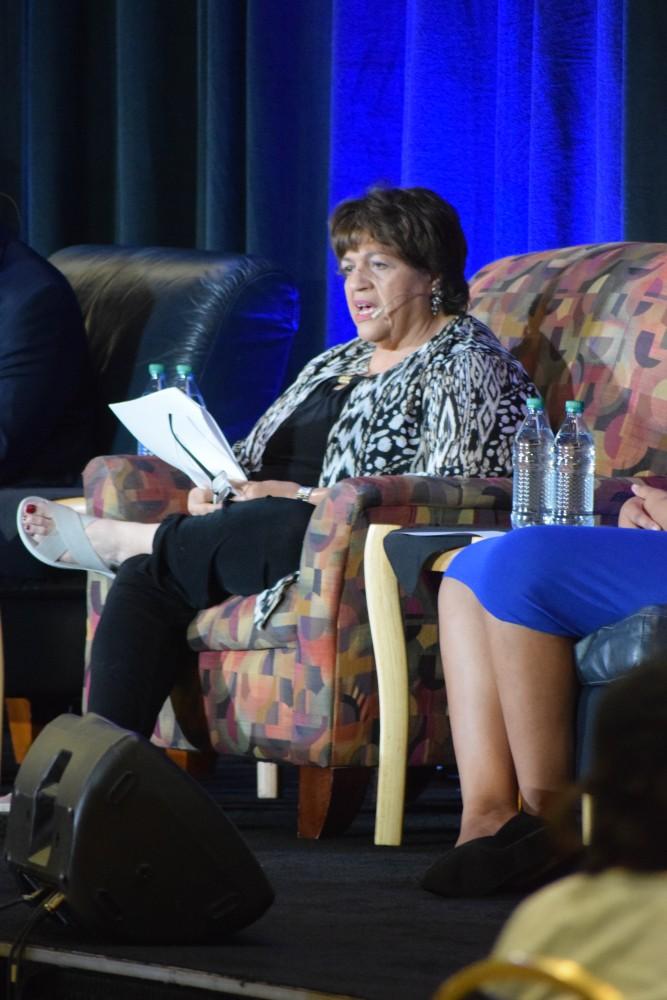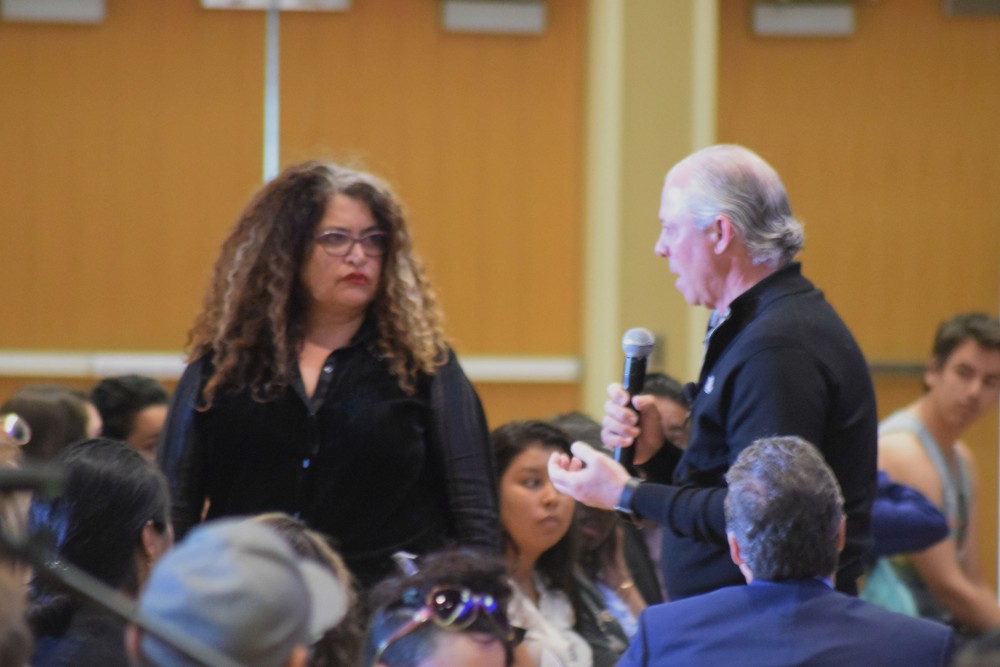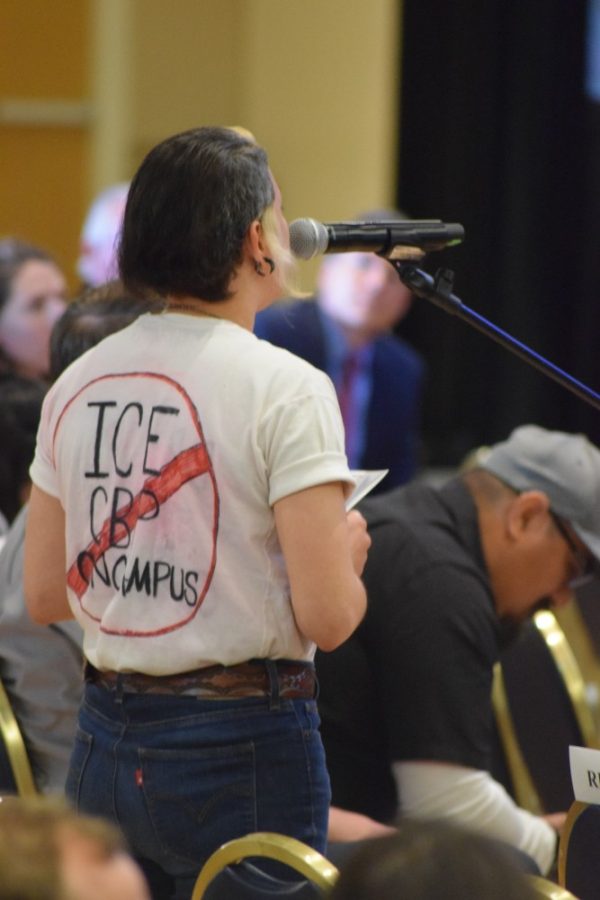Tensions were high while students and faculty repeatedly asked how the University of Arizona will protect its students without documentation during a Campus Conversation Forum Tuesday, April 23.
Though President Dr. Robert C. Robbins gave an introduction and was present for the entire conversation, he did not participate in the panel discussion.
“We have to provide support and safety for those who don’t feel safe and who have fear,” Robbins said. “At the same time, there are rules, and we will obey the law. I think this will be the first of many conversations.”
RELATED: ‘Arizona 3’ update: Charges dropped, UAPD investigation revealed, ‘Campus Conversation’ up next
While Robbins was finishing his remarks, a group of protestors interrupted him.
“Mic check. All changes come from disruption. Our silence will not protect us,” they yelled.
Nancy Montoya, a news and public affairs reporter for Arizona Public Media, moderated the conversation.
“Take this opportunity to speak loudly because these people are up here to listen to you,” Montoya said.

Natalynn Masters, president of the Associated Students of the University of Arizona, the university’s undergraduate student government, was on the panel and said she understood her responsibility as a student representative.
“Please hold me accountable, please hold student government accountable,” Masters said.
A member of the UA College Republicans said the fourth amendment protects students from being abducted on campus. He also said Border Patrol and Immigration and Customs Enforcement agents have free speech rights that should not be ignored just because not all students agree with their views.
One unnamed audience member said the way Denisse Moreno Melchor acted in the initial video of her protesting Border Patrol was “vile.” In response, Masters said she and other members of the panel were evaluating whether Melchor deserved to be criminally charged.
“What does it mean for a woman of color to be charged criminally for speaking out versus someone else on campus speaking out and going through the Student Code of Conduct process?” Masters said. “That is the key difference in what we’re talking about.”
Masters said later in the discussion she didn’t think the “Arizona 3” should have been charged but thought the discussion itself was a step in the right direction. The “Arizona 3” are a group of three UA students who were charged after an incident with Border Patrol agents on campus on March 19. The charges have since been dropped.
Nolan Cabrera, an associate professor in the College of Education and one of the panel members, cleared up a misconception about ICE and Border Patrol on campus.
“There’s this narrative floating around that students can’t get deported on the UA campus,” Cabrera said. “I just want to say I’ve seen it happen on our campus. In 2010, a woman got stopped for a moving violation on Mountain Avenue going to Second Street, right in front of the College of Education. To sit there and say it can’t happen – I’m sitting here saying it has happened here.”
He also said people need to think about the fear undocumented students experience.
“It’s very easy to be even-keeled when you’re not targeted, when you’re not under the threat of your family being separated,” Cabrera said. “When you’re not constantly under fear that one wrong step is going to mean that you’re going to be forced to go to a country you do not know. It is very easy to intellectualize that, so that it’s not about the very deep rooted fear and terror that these people are under on a constant basis.”
Sandra Soto, an associate professor of women’s studies, criticized Robbins and pointed out the UA was recently designated as a Hispanic-Serving Institution.
“I’ve been a professor at this institution for 18 years,” Soto said. “[I’ve] never, in these 18 years, have worked under a president who is so out of touch of what it means to be in the U.S.-Mexico borderlands. We are a Hispanic-Serving Institution now, and the president has allowed what has happened to happen under his watch – and not just passively. I would like to call on the president to join the panelists. We have questions for you, we don’t have questions for these panelists.”

Soto, along with another unidentified member of the Coalition for the “Arizona 3”, played an audio recording of what they claimed to be Art Del Cueto, vice president of the National Border Patrol Council. In this audio recording, a man is heard saying, “free speech doesn’t mean you need to be jumping in my face and talking all this garbage. [Unintelligible] I would have punched her in the throat.” The Arizona Daily Star independently verified it was Del Cueto.
Soto called on Robbins to respond to rumors he met with Del Cueto. Robbins denied ever meeting with Del Cueto.
“I find the comment despicable, and I’ve never met this man,” Robbins said.
Carol Brochin, an assistant professor of bilingual/multilingual education, was one of many audience members to request an apology from Robbins on behalf of the “Arizona 3.”
“On behalf of the Coalition of the Arizona 3, what we would really like is for our president and for others, including [the University of Arizona Police Department], to apologize to our students,” Brochin said. “Without an apology, it feels difficult to move forward.”
Audience members chanted for an apology from Robbins, saying the charges should never have happened. Robbins did not comment but shook his head to decline when asked to apologize.
RELATED: The saga of the ‘Arizona 3’: The story so far
Karlyn Bradley, a protester and political science student, told Robbins it was irresponsible of him to not participate in the discussion.
“That illustrates a lack of accountability on your part to make folks who had nothing to do with this decision-making process responsible for the mess that you have created,” Bradley said. “It shows your leadership – or lack thereof.”
Follow Priya Jandu on Twitter









